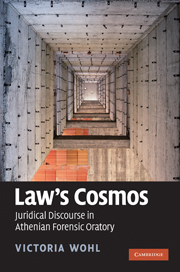Book contents
- Frontmatter
- Contents
- Preface: before the law
- Introduction: the rhetoric of law
- PART I THE BOUNDARIES OF LEGAL DISCOURSE
- PART II THE LEGAL SUBJECT
- PART III TIME, MEMORY, REPRODUCTION: LAW'S PAST AND FUTURE
- 5 Civic amnesia and legal memory: to remember and forget in the lawcourts
- 6 Family/law: legal genealogies
- Conclusion: the paradigmatic law
- Bibliography
- Index locorum
- General index
6 - Family/law: legal genealogies
from PART III - TIME, MEMORY, REPRODUCTION: LAW'S PAST AND FUTURE
Published online by Cambridge University Press: 07 September 2010
- Frontmatter
- Contents
- Preface: before the law
- Introduction: the rhetoric of law
- PART I THE BOUNDARIES OF LEGAL DISCOURSE
- PART II THE LEGAL SUBJECT
- PART III TIME, MEMORY, REPRODUCTION: LAW'S PAST AND FUTURE
- 5 Civic amnesia and legal memory: to remember and forget in the lawcourts
- 6 Family/law: legal genealogies
- Conclusion: the paradigmatic law
- Bibliography
- Index locorum
- General index
Summary
Genealogy does not pretend to go back in time to restore an unbroken continuity that operates beyond the dispersion of forgotten things…On the contrary, to follow the complex course of descent is to maintain passing events in their proper dispersion; it is to identify the accidents, the minute deviations – or conversely, the complete reversals – the errors, the false appraisals, and the faulty calculations that gave birth to those things that continue to exist and have value for us; it is to discover that truth or being do not lie at the root of what we know and what we are, but the exteriority of accidents.
Foucault 1977b: 146His father, Theopompus, has died, but the laws have not died, nor justice, nor the jurors who cast the vote.
Dem. 43.60NARRATIVE OF A FAMILY TREE
If in the amnesty cases juridical discourse masters civic time through legal memory, in inheritance cases it controls biological time via familial succession. Through the contested movement of property, inheritance law links the present generation to its dead ancestors and future heirs. In these cases, the law constructs and reproduces a normative family structure. In the process it also reproduces itself, projecting itself into both the past and the future. Inheritance cases are thus about genealogy in two different senses: they record the legitimate reproduction of the genos and at the same time write a history of the law.
- Type
- Chapter
- Information
- Law's CosmosJuridical Discourse in Athenian Forensic Oratory, pp. 243 - 286Publisher: Cambridge University PressPrint publication year: 2010



